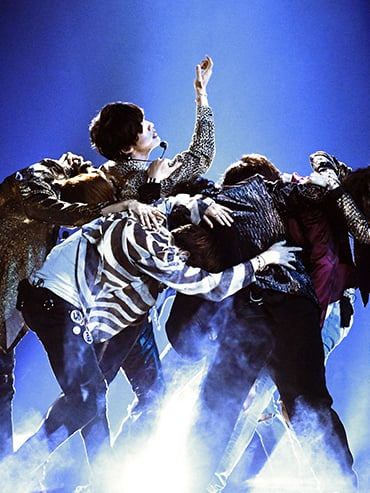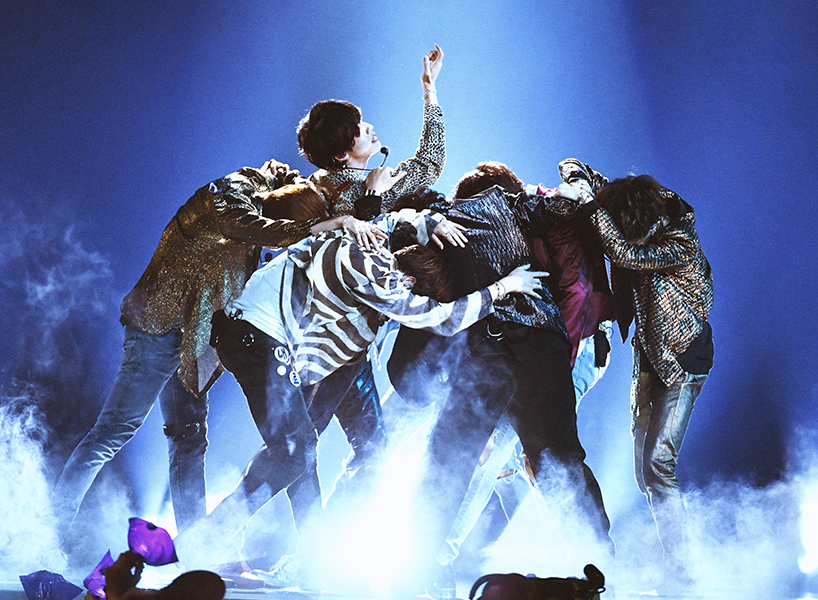BTS Won’t Cure My Depression, But Loving Them Helps Me Cope
*Trigger warning* This article contains references to self-harm


It was nearly 4 a.m. and I found myself in a panic. Two days earlier, my grandpa had passed away. He had always been my best friend and biggest cheerleader, and losing him had sent me over the edge. Self-harm has never been a mechanism I’ve used to deal with my depression, but for some reason that night the urge was terrifyingly strong. I needed a distraction. Quick.
Music, it had to be music. I clicked onto YouTube’s home page and there, in my recommendations, was “I Need U” by BTS. I was already a K-Pop fan, but this was a totally different experience. Both the song and the video embodied the paralyzing feeling of being at your worst. When I heard lines like, “The sky is so blue, the sun is so bright, so you can see my tears so clear,” I felt like they understood what it felt like to feel defeated. These seven strangers were singing about something I was going through, and though what we were all feeling was bad, I was reassured because I wasn’t the only person who felt this way.
The video’s visual symbolism, including Jungkook zoning out in public, Jimin sinking into a tub and Hoseok throwing his medication into a pit of fire, was similarly sad, but it also made me feel less alone. Most of the K-Pop I was listening to at the time was upbeat and happy, so there was something comforting about seeing this kind of vulnerability. And the fact that they were making music about experiences that I shared—and that had been making me feel alienated for years—made curious about who these seven guys even were, as artists and most of all, human beings.
I’ve known something was wrong since I was a kid
I knew I was unwell by the age of 11, when locking myself in my room out of sadness became a daily routine. I had a hard time socializing—it felt like a performance, and something as simple as holding a conversation would leave me feeling totally burnt out. I regularly asked myself, “why can’t I be happy?” and “what’s wrong with me?” Kids would bully me for not being able to play properly or for my habit of pulling out my eyebrow due to anxiety. Being in pain and having no idea why is awful, and when you’re a child, nothing is more confusing than not understanding why it hurts to just be you.
Even now, I struggle with social interactions. Sometimes I disassociate. My mind goes mute and I’m suddenly unable to actively participate in a conversation. People often misinterpret this as rudeness, but the truth is, I’m just trying to keep it together enough to un-clutter my brain and not space out entirely. My depression has lead me to become my own worst critic now that I’m adult. As a child, I dealt with it by picking at my skin or hair, but now I just pick on myself. I am always on some sort of fad diet, dying my hair or spending a load of money on makeup and clothing in an effort to becoming someone I might actually like.
In my third year of university I remember reading a quote by the French philosopher Albert Camus, who said, “Sometimes, carrying on, just carrying on, is the superhuman achievement.” That’s exactly how I felt. But, I was too nervous to discuss my health with my family, let alone a psychiatrist, so I decided I would dive into something that would make me feel better as a form of self-care. At the time I was interning at my dream company, getting good grades and had an incredible group of people around me that showed nothing but love. It felt selfish to admit none of that had made things any better, so I continued to project an image of confidence and joyfulness, even though that was entirely a lie.
How I discovered K-Pop
The more I tried to perform happiness, the more I felt overwhelmed with pain. By the next year, my mom admitted she noticed signs that things felt off, despite my best efforts to hide what was going on with me. She took me to seek help and months before graduating, I was officially diagnosed with clinical depression. My psychiatrist began recommending different methods of self-care and out of desperation to get better, I was ready to try anything and everything out just to feel okay again.
I tried blogging, working out and even becoming a vegan. Then, a friend recommended listening to K-Pop as a self-care method. I loved it. Shinee’s “View” became my friend group’s summer anthem and I became obsessed with another artist, IU.
I’ve always been open-minded about listening to music without worrying about what language it was in. Bops are bops and when we can’t understand them, well, translations exist for a reason. K-Pop made me excited to explore a new culture, new language and a new way of bonding with friends that I was eternally grateful for. There was finally something to look forward to and get excited about. I just didn’t realize it would make me confront my own struggles until I saw the “I Need U” video for the first time.
K-Pop isn’t very open about mental health—but BTS is
K-Pop isn’t the most inviting industry when it comes to open discussion of anything that could be construed as “controversial.” If you’re unfamiliar with how the industry works, celebrities, otherwise known as idols, are pretty much expected to show no negative human emotion (except heartbreak, which is acceptable). BTS, however, has never shied away from conversations about mental health. They know, and can relate, to dark thoughts, anxiety and depression.
In their recent YouTube Red series, Burn the Stage, Jin, the eldest band member, opens up about trying to stay positive for the younger members despite feeling “depressed very often” and having “a dark side, too.” Namjoon, the group’s leader, calls his personal anxiety a “shadow” and admits “I wouldn’t say that I am overcoming the ambivalent feelings on the other side of my mind, but it seems that every human being needs a resting place because he or she has to go with the inevitable solitude or darkness.” And Yoongi has been particularly outspoken about his own mental health struggles, particularly on his solo album, Agust D.
But they also try to reassure fans that things will get better. On their new album, Love Yourself: Tear, the group’s youngest member, Jungkook, helped write and produce a song called “Magic Shop” that features honest lyrics like, “On a day you hate being yourself, on a day you want to disappear forever, let’s build a door to your mind,” and “I wanted to comfort you, move you, I want to end your sadness and pain. You gave me the best of me, so you’ll give you the best of you.”
During their recent comeback show in South Korea, Jungkook explained the meaning behind the song, saying, “When you want to escape from the reality, you open the door in your mind, there will be Magic Shop & 7 of us in there.” If you’re not part of the BTS fan community, it might not seem like a lot, but for those of us who are, that song could save a life. It’s another reminder that their fans’ well-being is genuinely important to all seven members.
Other BTS fans help, too
That’s why, while we might never meet, I know BTS is rooting for me and every single other young person who is finding it hard to love themselves. Loving them clears my thoughts, and makes me optimistic and more conscious about all of the blessings that come my way. Just being a part of their fandom makes me feel like I’m part of something bigger than I can put into words. My fellow fans are some of the most charitable, caring and wildly hilarious group of people that you’ll ever come across online. They come from all different walks of life and make every day worth looking forward to—just as much as the boys do.
That’s why I get so annoyed when Western interviewers makes BTS’s ARMY, the nickname our community goes by, out to be vapid, boy crazy fans. BTS might have their bright sides that make us laugh and internally scream at how cute they can be, but they’re also not afraid to show us the sides that make them human, either—and that’s what we are really responding to. What’s more, fans from across the world have been open about their struggles with mental health, despite the stigma that makes us feel like we’re not normal and should be ashamed of ourselves. The courage it takes to open up online about how BTS has helped them cope is so commendable that anyone who insensitively calls us insane should feel ashamed. So when the media wants to label the ARMY as crazy, they should think twice about the weight and stigma a word like that carries for those who support BTS and are unwell. Hell, even BTS knows it’s messed up and it’s not even their native language.
ARMY members are also constantly sharing their own stories about struggling with mental health online to remind one another they’re not alone in this. They’ll even go the extra mile to send out daily reminders for us all to take care of ourselves. They aren’t a bunch of teenage girls with raging hormones gawking at who’s hotter. They’re real people, with real struggles, who have come together to be apart of a family that’s all about love.
Enjoying BTS’ artistry and personalities for the past three years has been a key part of escaping—and confronting—my own sadness. Just listening to their music, watching them perform or seeing them stay true to themselves in interviews and shows makes me feel like I’m not alone. They know what it likes to go through the ups and downs of feeling overwhelmingly happy with yourself one day and feeling like you’re suffocating for no reason the next. And, when I listen to their music, it’s easier to be positive.
My favourite line ever from Bangtan was when Yoongi penned: “May your trials end in full bloom.”
I hope they do, too. For all of us.
This article was originally published on May 25, 2018.
Related:
How to Get BTS’s “Fake Love” Style But, Like, On a Budget
Did K-Pop’s Dark Side Contribute to Jonghyun’s Death?
BTS’ Kim Namjoon’s Style is Seriously Next Level








